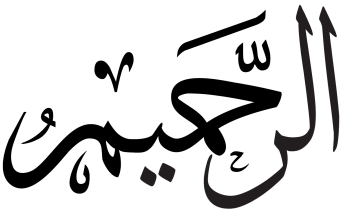AR-RAHEEM-The Bestower of Mercy The Merciful

Benefits of belief in these two names include the following:
The One who grants even more grace and greater rewards in response to our good actions and high thoughts.
The One who greatly rewards those who use the Divine bounties and beneficence in a good way.
The One who has mercy on the merciful.
From the root r-h-m which has the following classical Arabic connotations:
to have tenderness, gentleness, kindness
to love
to have mercy, to have pity
to show favor and goodness
to have all that is required for beneficence
This name is used in the Qur’ān. For example, see 1:1
The root r-h-m also indicates womb; meaning that which provides protection and nourishment, and that from which all of creation is brought into being.
Rahmān conveys the idea of fullness and extensiveness, indicating the great quality of love and mercy which engulfs all of creation without any effort or request on our part, while Rahīm conveys the idea of constant renewal and giving liberal reward to those who are deserving.
Al-Rahmān is the Beneficent One whose endless outpouring of love and mercy are continually showered upon all of creation, while al-Rahīm is the Merciful One whose love and mercy are manifested as that which is received as the consequence of one’s deeds.
According to Ibn Qayyum (1350 AD), Rahīm expresses the continuous manifestation of the Grace in our lives and its effect upon us as a result of our own activities.
In Muhammad Ali’s translation of the Qur’ān, he refers to classical sources (as indicated by the initials in parenthesis) who said:
Rahmān and Rahīm are both derived from the root rahmat, signifying tenderness requiring the exercise of beneficence [kindness] (R), and thus comprising the ideas of love and mercy.
Al-Rahmān and al-Rahīm are both active participle nouns of different measures denoting intensiveness of significance, the former being of the measure of fa’lān and indicating the greatest preponderance of the quality of mercy, and the later being of the measure of fa’īl and being expressive of a constant repetition and manifestation of the attribute (AH).
The Prophet is reported to have said: “Al-Rahmān is the beneficent One whose love and mercy are manifested in the creation of the world, and al-Rahīm is the merciful One whose love and mercy are manifested in the state that comes after” (AH), i.e as a consequence of the deeds of men. Thus the former is expressive of the utmost degree of love and generosity, the latter of unbounded and constant favor and mercy.
Lexicologists agree in holding that the former includes both the believer and the unbeliever for its objects, while the latter relates specifically to the believer (LL).
In the Dictionary of the Holy Qur’ān, Abdul Omar quotes from classical resources:
Rahmān is an active participle noun of the measure fa’lān which conveys the idea of fullness and extensiveness and indicates the greatest preponderance of the quality of love and mercy which comprehends the entire universe without regard to our effort or asking, even before we are born. The creation of the sun, the moon, air and water, etc are all there because of this attribute…. the term Rahmān circumscribes the quality of abounding Grace inherent in and inseparable from the Almighty.
Rahīm is in the measure of fa’īl and denotes the idea of constant repetition and giving of a liberal reward to those who deserve it and seek it. The Manifestation of this attribute is in response to and is a result of the action of the human being. That is, Rahīm indicates that which is extremely and continuously loving and merciful, and who is the dispenser of grace and love as a result of our deeds and supplications, and the One in whom the attribute is constantly and [endlessly] repeated.
